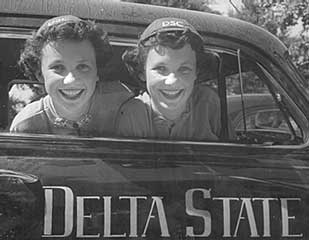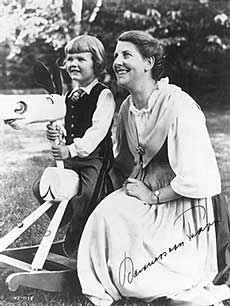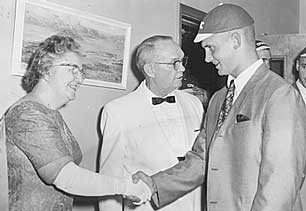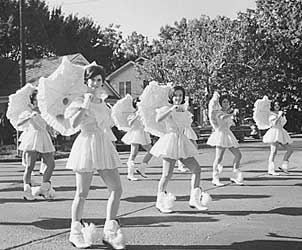
Welcome | History | Student Life | Academics | Reflections | Contact Us

Welcome | History | Student Life | Academics | Reflections | Contact Us
Everyone at one time or another has probably experienced a feeling of deja vu. However, in this case, it isn’t doublevision or anything else of the sort. Janeil and Nancy Pickett show off their freshman beanie caps and each others mirror image. They have both long since graduated, but their memories of Delta State along with those of thousands of other students still remain.

Please Note: The following are excerpts from oral history interviews conducted at Delta State University. In some cases they have been edited for length and clarity.
Dr. Walters: . . . Daddy believed in putting aside money for everybody’s college fees. I used that. I probably wouldn’t been able to go to school if it hadn’t been for that in that particular time because that was back in the depression years. I entered Delta State in 1930.
Ms. Zachary: What do you remember about the depression?
Dr. Walters: Well I just remember that money was real tight. You didn’t have a lot of extras. You were very careful with what you had. . . In tho

An autographed photo of Baroness Von Trapp signed at Delta State
se days, college students could get into a movie for twenty-five cents . . .
Dr. Walters: . . .Then when I came back to teach, the first year I was there,
the fall quarter of 1943 the Von Trapp Family did their . . .american program at Delta State on a Friday night. The Baroness and the girls stayed in Cleveland Hall, and I was living in Cleveland Hall at that time because when I came back here to teach their was no residence hall for women teachers at Delta State. Cassidy Hall hadn’t been built. It wasn’t built until 1950. Women teachers had a lot of difficulty finding a boarding place in Cleveland. They would take men, but they didn’t want women. I guess they thought they would be around under their foot too much. I lived in Cleveland Hall my first years of teaching. I was on duty that weekend because Ms. Crawly, the housemother, had the weekend off. I took one weekend a month, and kept office. So the Baroness and I spent all day Saturday in the office together. I just had the best time talking to her. She didn’t look anything like the one who played in the Sound of Music. She was kind of older and a heavyset person. She was a lovely person. Father Rotunda had made arrangements to have his regular service early that Sunday so that the Trapps could have access to the church because they traveled with a priest. So when she started to leave the building at ten o’clock, she came in the office, and she said, “Would you like to go with us?” I said, “Will that be alright?” She said, “Yeah, we would like to have you.” So I ran upstairs and got my hat because those days you didn’t go to a Catholic Church without a hat on. We walked down to the church. They did the entire mass. They sang the entire mass. Father Rotunda, the Catholic priest here, and Mary Katherine Gerald who was member of that church and on the faculty at Delta State and I sat there. We got to hear the Trapp family do an entire mass. I will never forget it. It was the most memorable experience I had ever had. . . It happened right here in Cleveland . . . I have been over in Austria, and seen the route that they took. I have been by the convent that helped them get out. They show it in the movie, The Sound of Music.
Mrs. Caylor: . . . There are too many lights here. I don’t know what the dating  couples do. Of course we couldn’t go off in cars like they do now. East end of Cleveland Hall didn’t have a whole lot of light. When that cute little old man, old shriveled up man who was the night watchman came around the corner and saw John and I sitting there. He would just turn and go back. He didn’t bother us. That was a nice place. Every night you could find some couple out there on those steps because it was not quite as bright.
couples do. Of course we couldn’t go off in cars like they do now. East end of Cleveland Hall didn’t have a whole lot of light. When that cute little old man, old shriveled up man who was the night watchman came around the corner and saw John and I sitting there. He would just turn and go back. He didn’t bother us. That was a nice place. Every night you could find some couple out there on those steps because it was not quite as bright.
Mr. King: . . .The girls had to be in at ten-thirty. Each Wednesday about ten a.m. there was an assembly period in the old Broom auditorium. It held all of us. You were encouraged to attend the assembly. There was a whole lot of cutting going on there. Everybody wouldn’t go. That is when Dr. Kethley laid his sap rising speeches. You look like you haven’t heard this before. In the spring when the leaves begin to bud out on the trees, he was a jewel. He would stand up there, and he would say, “Now children, your mamas and papas sent you up here for me to take care of.” I know the birds are singing, and I know the leaves are coming out on the trees. You boys and girls are looking at each other like you haven’t ever seen each other before. He said, “The saps is rising.” He would warn you about all these little pit falls that you might run into. We called it the annual Sap Rising Speech. He was good.
 Mr. Walker: . . . Intramurals were important as they are now. I enjoyed that. Movies were big then. We had three movie theaters in Cleveland . . . We had to walk to them because nobody had a car. We used to go to movies all of the time. It was about the only thing you had to do.
Mr. Walker: . . . Intramurals were important as they are now. I enjoyed that. Movies were big then. We had three movie theaters in Cleveland . . . We had to walk to them because nobody had a car. We used to go to movies all of the time. It was about the only thing you had to do.
Mr. Hendon: Were there any rules or conduct, behavior, curfew, visitors, or dress that you remember? How did you feel about them?
Mr. Walker: Well because there was so many you didn’t think too much about them. You just took them for granted and worked around them. Not too many restrictions on the boys, but there was a lot on the girls. I know the girls couldn’t go out. They couldn’t even leave the dorms at night, but maybe only twice a week. The place that we met up to see our girl friends was the library. They could go to the library, but that was it. They were restricted as to getting into cars. You couldn’t ride around in a car until you were a senior. Everywhere we went, we had to walk. We would walk to the movie, and all that kind of stuff.
Mr. Walker: We had a lot of things scheduled out here on campus. We had a lot of dances. One thing that the physical education club did was we had square dances. They really were a lot of fun. We went to the movies. I supported the athletics. We had plays. The Delta PlayHouse would have plays from time to time. I would say at least once every quarter. Various groups would come in and perform like in the Bologna Performing Arts Center.
Mr. Hendon: Speaking about dances, how did you dress? Who were the bands? Was there drinking? Were their chaperones?
Mr. Walker: At that time everybody wore coat and tie. Nobody would wear a suit. You would go casual. Maybe twice a year we would have a formal dance, and we would wear tuxes. The girls would wear long dresses. One of the bands that came quite frequently came out of Vicksburg was called the Red Tops. They are still reknown in Vicksburg even today. I don’t think drinking was quite as prevalent then as it is now. Yes we did have people there to look after us.
Mr. Hendon: Could you tell me where you all went on your dates?
Mr. Walker To the movies.
Dr. Wyatt: Well I guess the enrollment at Delta State was probably three hundred or something like that back in 1945 or 1946, and then the G. I.’s started coming back. We grew to about 600 to 700 students, and of course that was pretty rapid growth for us. They were all kinds of involvements when you have older men coming back who have been at war. Now coming back and having to fall under certain guidelines that Delta State Teachers College had established. I remember living in the dormitory growing up there would be all kinds of tricks that these older guys would play on the younger normal freshman and sophomore students. I remember they even had cows brought into dormitory. They would take some youngster out, a young freshman out, to some place out in the country, and act like one of those who took him out there got shot. He would come running back in to get help for his buddies. Of course nothing had happened to the individuals, just all kinds of pranks. Nothing was very serious.
Dr. Wyatt: . . . We had very little traffic. I can remember at Delta State when the men started coming back to school there was still very few automobiles on campus. These guys started coming back and getting the G. I. Bill, and some of them could have a car. It was highly unusual for a student back in those days to have an automobile. Today, you about have to have an automobile in order to go to college . . .
Ms. Zachary: When you were a freshman was there hazing? What kinds of things did you all have to do?
Dr. Wyatt: Oh there was bad hazing. In fact my freshman year I was going out for football, and I was not staying in the dormitory. So this was before college started, and I was going out for football. Then they cut all of our hair. They would cut everything except one long strand right in the middle of my forehead. It looked like you had a pigtail on the front of your head. Cleveland High School was playing their first football game. So three of four of us guys that had gotten through with football practice, and we went down to see the ballgame.
My mother was sitting by my dad at the ballgame, and my dad had told her

A freshman sporting a shaved head and a green beanie greets President Ewing and his wife
that they were shaving heads. I walked by and she said I hope he doesn’t look as bad as he does and that was me. So the guys got their heads shaved. The reason why they shaved the freshman’s heads was in order to give the upperclassman a better chance with the new freshman girls coming in. Make the guys look bad so that the upperclassman could have the first shot at the freshman girls. The biggest initiation that we had at Delta State was the M club initiation. It was quite long, and it actually it was too severe. Of course we did away with that many years ago. If you lettered in a sport then you would be eligible to be inducted into the M club, which was our athletic club. Then they would have initiation one night, and they would take you to the Whitfield gym. They would have the windows covered, and they would strip you down. They would run you through different kinds of gymnastics. They would pop you with belts and paddles. Then they would let you put shorts on, and they would blindfold you. They put glue in your hair and all kinds of stuff. Then they take you all in a big truck, and they would start out. They would put one person out here, and another out there, and another out here.
I thought well I have lived in Cleveland, and they were not going to lose me. When that truck turned the corner I was going to know exactly where I was all the time. They got out on the highway, and they went in a circle. Then they went some place else. Then went back in a circle. I was lost. They put F. L. Stephenson and I out together. We got out and took our blindfolds off. I had no idea where we were. We were in a cotton field. There were no lights anywhere. They were on a kind of old dirt turn road. . . So we walked I guess a mile or so, and came upon a house this was near midnight. The dogs started barking. We were scared, and it was cold. We hollered at the house, and a guy came out. . . He had gone to Delta State, and he knew what was going on. They let us come in, and let us use the phone. They let us sit by a fire for a minute or two and warm up some. We were by the Greenville Airport. . . Then of course if you made it back home then everything was fine, and you were a member. Next day you had a dinner, a banquet something of that nature. That was some of the hazing that took place.

Delta Belles on parade
Ms. Franklin: Dr. Ewing, after he had been here for a year, he brought Ralph up here. Ralph had a show band, which appealed to the public.
Ms. Willis: Was it a kind of a jazz band?
Ms. Franklin: No, no, no, it was like the shows would be like pageantry. Is wasn’t the drum core style. We made figures. A lot of them were at night. They had cat lights on their cabs. We used fireworks. We used spotlights. We used all kinds of things. People loved it. They would come for that as much as the football games. They loved the Delta Bells. We had these props and things. When we would have a parade, they would be just packed on the street.
Ms. Willis: They would perform for every football game. Was it before or after or both?
Ms. Franklin: Half or whatever. We usually had a half-time show that would have a theme. We might play fifteen different numbers that all went around a certain theme making outlines. We had some drills too. We always had a dance by the Delta Bells. I remember one time; we had a girl dancing in a silouhette of a moon. She was the silouhette. We had all these props we used. People loved it.
Ms. Willis: Of course that is entertainment.
Ms. Franklin: Yeah, Dr. Ewing loved it too. He knew that was appealing to more people. . . We went all over the country to parades and half- time shows. We went to the Gator Bowl. We went to the Oilers and Gator shows. We went up north to a lot of parades. We went to Washington, Cleveland, and Detroit. We also did lobby shows. That meant a smaller group. We would go in a hotel lobby or on the street and give a little show. . .
Mr. Nowell: Well, it was on Sunday, I remember that, a cloudy day, rainy, we were at the movie, uptown at the Ellis Theater. . . when we came out, there were a lot of people gathered out in the street, and a lot of horns honking and people going around. And, we wanted to know what was going on, and they told us that Japan had attacked Pearl Harbor. And, of course, it was really a shock, and we all came back out to the campus, and, of course, back in those days there was no such thing as a television in the lobbies of the dormitories. . . we had a big radio, console radio in there. . .that’s when we first heard about it. . . The fact is that later that afternoon, all the boys got together and marched around the campus and we finally ended up over in front of Dr. Kethley’s house, the president at that time and let him know that we were all ready to enlist and go into the service and fight for our country. He came out on the

The Marshall plan was announced at a meeting of the Delta Council on May 8, 1947
front of his house and gave us a little speech, and then we kept marching around, and finally came on back in the dormitory. . . and then that went on during the whole week. Even that first week, there were a lot of boys that. . . went on and volunteered in the various services. . . it was an exciting time, but also a sad time.
Mr. Stanford: O. K, later on, we got word that Truman was going to visit Delta State. When did you first hear about that?
Mr. Nowell: Of course, I wasn’t at Delta State when this happened. He was coming here for a, for a Delta Council speech, and that was on May 8, 1947. I lived in Louisiana at that time, but I had relatives that lived in Cleveland, and they told us that the President was coming here. So, we, my father and I, came up here. . . However, Truman did not come. So he sent his undersecretary, Dean Acheson, to come and make the speech. And it was on that day that Dean Acheson first announced the Marshall Plan. . . the lend-lease program. . . that saved Europe after World War II, and it was very important. . .